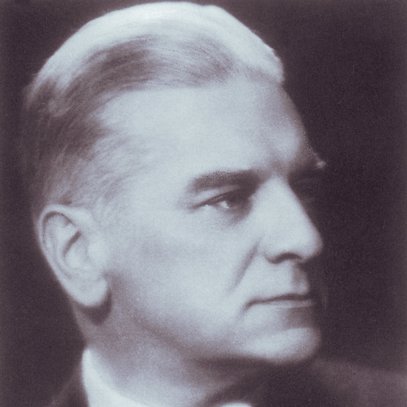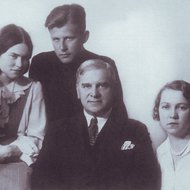Jurgis Karnavičius
Composer Jurgis Karnavičius (1884-1941) commenced his creative career in early 20th century. His creative life was associated with both Russia and Lithuania. In Lithuania the composer wrote his most significant opuses, namely operas "Gražina" and "Radvila Perkūnas", which brought fame to him in Lithuania and warranted him the name of the composer of the first Lithuanian opera. Late romanticist composers, Russian classical tradition, Lithuanian folklore and early 20th-century modernism moulded Jurgis Karnavičius as a composer.
Renata Varanavičiūtė
Jurgis Karnavičius - The Oval Portrait
Biography
Composer Jurgis Karnavičius (1884-1941) commenced his creative career in early 20th century. His creative life was associated with both Russia and Lithuania.
While in Russia, he graduated from two higher schools in Peterburg, reached maturity as a composer, was actively involved in work of both artistic council of Peterburg Philharmonic and contemporary music association, was a founder and a member of vocal and string quartets, conducted military district symphony orchestra, was active as a lecturer and pedagogue.
In Lithuania the composer wrote his most significant opuses, namely operas "Gražina" and "Radvila Perkūnas", which brought fame to him in Lithuania and warranted him the name of the composer of the first Lithuanian opera.
Jurgis Karnavičius was born in Kaunas on May 5, 1884. He spent his childhood and adolescent years in Vilnius. In 1903 he arrived to study in Peterburg, where he earned a Degree in Law from the university in 1908. He also studied at the conservatoire, earning degree in vocal studies in 1910, and degree in composition in 1912 (studied with Maximilian Steinberg). In 1913-1914 and 1918-1927 Jurgis Karnavičius taught at the Peterburg Conservatoire. In 1914 he was recruited to Russian Army. Taken to German prison he lived in Josephstadt, near Vienna, until 1918. Upon his return to Lithuania, in 1927-1933 Jurgis Karnavičius played viola in Kaunas State Theatre orchestra and taught at the Kaunas Conservatoire until 1941. In 1938 he was conferred a Professorship. Jurgis Karnavičius died in Kaunas on December 22, 1941.
Late romanticist composers, Russian classical tradition, Lithuanian folklore and early 20th-century modernism moulded Jurgis Karnavičius as a composer. His works for stage are more traditional. These include two operas, based on Lithuanian folklore, and four ballets, where the composer employed uncomplicated musical language and intonations characteristic of late romanticism.
Jurgis Karnavičius was also affected by modernistic trends of the early 20th century, which manifested in his symphonic ("Ulalume", "The Oval Portrait"), some chamber and vocal works. Combined with Russian classical tradition, his experiments with new forms of expression resulted in using dissonant harmony with shifting tonal centre, employing polyphonic techniques and innovatory instrumentation.
Renata Varanavičiūtė
Filter works by
Work title/Composer/Instrumentation | Samples | Resources | ||
|---|---|---|---|---|
Year/ |
No./Work title/Composer | Publication |
|---|
No./Work title/Composer | Publication |
|---|

